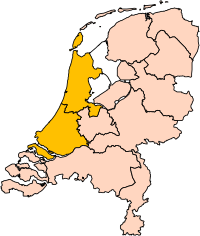
I live in Friesland. That's somewhere in the North of the Netherlands.
So I don't live in Holland. Read it here:
Holland is a name in common usage given to two regions in the western part of the Netherlands. The name 'Holland' is also often mistakenly used to refer to the whole of The Netherlands. From the 10th century to the 16th century it was a unified political region ruled by the Count of Holland. By the 17th century, Holland had risen to become a maritime and economic power, dominating other parts of The Netherlands. Today, the former County of Holland consists of the two Dutch provinces of North Holland and South Holland.

The name Holland first appeared in sources in 866 for the region around Haarlem, and by 1064 was being used as the name of the entire county. By this time, the inhabitants of Holland were referring to themselves as "Hollanders".[1] Holland is derived from the Middle Dutch term holtland ("wooded land"). This spelling variation remained in use until around the 14th century, at which time the name stabilised as Holland (alternative spellings at the time were Hollant and Hollandt). Popular, but incorrect, etymology[citation needed] holds that Holland is derived from hol land ("hollow land") and was inspired by the low-lying geography of Holland.The proper name of the area in both Dutch and English is "Holland". "Holland" is a part of the Netherlands. "Holland" is informally and quite incorrectly used in English and other languages, including sometimes the Dutch language itself, to mean the whole of the modern country of the Netherlands (this example of pars pro toto or synecdoche is similar to the tendency to refer to the United Kingdom as "England").
The people of Holland are referred to as "Hollanders" in both Dutch and English. Today this refers specifically to people from the current provinces of North Holland and South Holland. Strictly speaking, the term "Hollanders" does not refer to people from the other provinces in the Netherlands, but colloquially "Hollanders" is sometimes mistakenly used in this wider sense.










